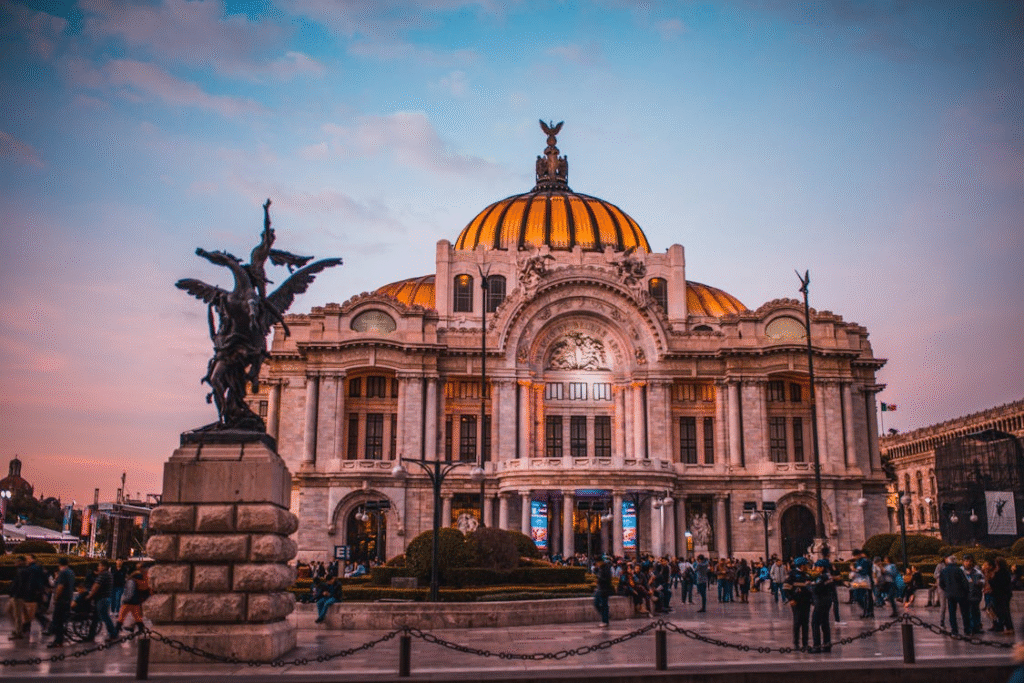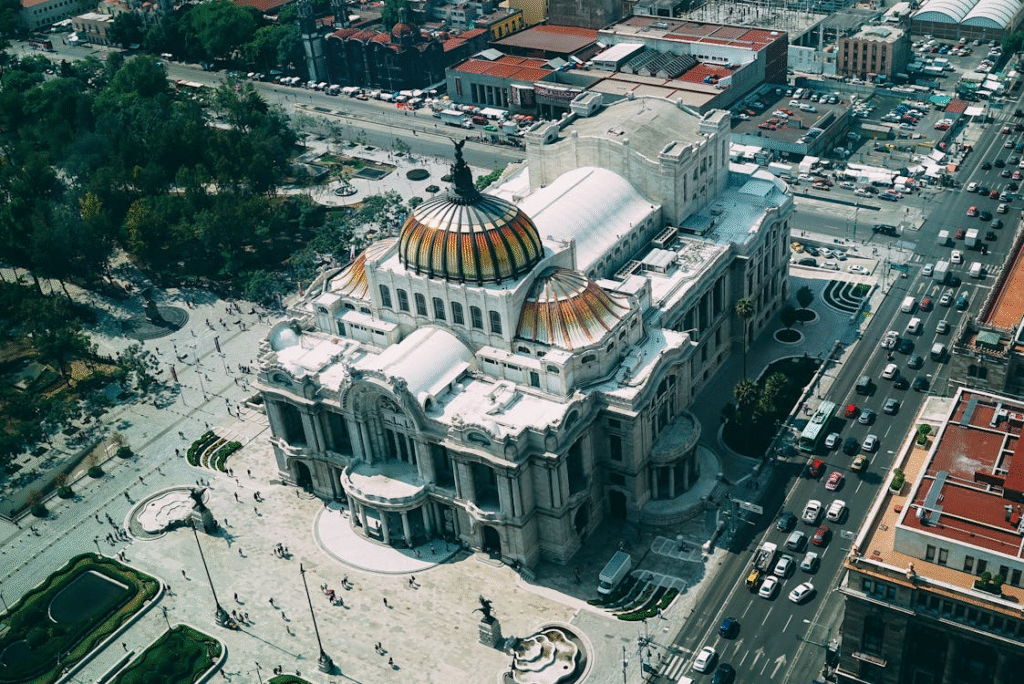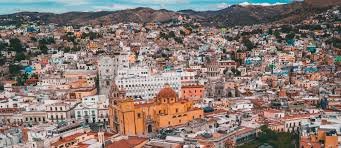🇲🇽 Ready to start a new adventure across the Channel? If you’re planning a move to Mexico, this guide will give you all the practical steps, updated costs, and streamlined advice you need for a smooth transition.
What should I know about living in Mexico at a glance?
- Flag: 🇲🇽
- Population: ~129 million (national, 2025)
- Currency: Mexican Peso (MXN) — Prices are usually compared internationally in USD or EUR.
- Average salary: between MXN 200,000 and MXN 220,000 per year (~EUR 10,000–11,000)
- Live MXN ←→ Dollar: Use dynamic currency converters for the latest exchange rates (INEGI, 2025 ; IMF, 2025 ; Bank of Mexico; XE, 2025 )
Reviewed by INEGI (Mexico’s National Institute of Statistics), June 2025; Bank of Mexico, last updated July 2025; XE Financial Data Team, last updated July 2025.
How much does it cost to move door-to-door to Mexico?
The cost of moving to Mexico depends on shipment size and transport method. Typical market rates as of mid-2025 are:
| Move Type | Time | Cost (EUR or USD) |
| 20 ft container (FCL)⁺ | ~4–7 weeks | USD 1,800–3,500 (≈ EUR 1,650–3,200) |
| 40 ft container (FCL)⁺ | ~4–7 weeks | USD 3,000–5,800 (≈ EUR 2,750–5,300) |
| Air freight (~1 m³ / ~200 kg, door-to-door) | ~5–10 days | USD 2,500+ (≈ EUR 2,300+) — air freight is fast but substantially more expensive (price depends heavily on origin & urgency) |
| Customs & duties fees | — | Mexico applies 0–20% import duty depending on goods category + VAT (16%) on import value including duty & shipping costs. |
Reviewed by Freight & Relocation Market Data Teams (various international shipping-providers to Mexico), last updated in mid-2025.
Use a real-time moving cost calculator for tailored quotes with ReloAdvisor.
Real-life case: “I moved to Mexico City in April 2025 with about 25 cubic meters of personal belongings using a 40ft container from Los Angeles. The total cost—including door-to-door pick-up, sea freight, and delivery to my apartment in central Mexico City—was around USD 5,000. The relocation company in Mexico handled customs clearance at the Port of Veracruz and arranged final delivery despite traffic congestion and narrow access roads.” — Ximena R., moved in April 2025
Importantly, many people moving to Mexico choose to relocate to one of the five most popular cities, including Mexico City, Guadalajara, Monterrey, Puebla, and Mérida. These cities combine strong infrastructure, diverse job markets, and vibrant expat communities.

What are the customs and duty rules when moving belongings?
If you’re relocating to Mexico, you may qualify for duty-free import of used household goods under Mexican Customs rules. To be eligible:
- Items must have been owned and used for at least 6 months.
- Goods must arrive within 6 months after your move.
At customs, present:
- Inventory list of goods
- Passport and valid visa/residence permit
- Proof of residency abroad
⚠️ New items, vehicles, alcohol, tobacco, or high-value goods may be subject to Mexico’s import duties (generally 0–20% depending on goods category) plus 16% VAT on the customs value including freight and insurance.
Reviewed by Mexican Customs (Servicio de Administración Tributaria – SAT), last updated in mid-2025.
What is the cost of living in Mexico?
The average monthly cost of living in Mexico for a single occupant—including rent, groceries, transport, and utilities—is approximately €800–1,500 per month, varying by city.
| Expense | Mexico (EUR/month) |
| Rent (1-bedroom flat in city centre, Mexico City average) | ~€500 / outside centre ~€300 |
| Groceries (single person) | ~€200–250 |
| Transport (monthly public transit pass) | ~€25–40 |
| Utilities (electricity, heating, etc.) | ~€50–90 |
Reviewed by Numbeo Data Quality Team, last updated in July 2025
What do I need to know about Mexico visas and residency?
Most foreigners require a visa or residence permit to live in Mexico. Options include: Temporary Resident Visa, Permanent Resident Visa, Work Visa, Student Visa, Family Reunification Visa, and the Investor Visa program.
- Visa categories and eligibility check: https://www.gob.mx/sre
- Visa/residence permit application portal (for appointments and documents): https://www.gob.mx/inm
Reviewed by the Mexican Ministry of Foreign Affairs (SRE) & National Institute of Migration (INM), last updated in June 2025
What’s required to import a car or swap a driving licence?
Vehicles must comply with Mexican emissions and safety standards. Import duties, VAT (16%), and registration fees apply.
Driver’s licences from certain countries (e.g., USA, Canada, Spain) can often be exchanged directly or recognized for a limited period. Others may require taking a local driving test (theory + practical) before a Mexican licence is issued.
Reviewed by Secretaría de Comunicaciones y Transportes (SCT) & Mexican Customs (SAT), last updated in July 2025
How can I bring pets with me to Mexico?
Pets must be microchipped, vaccinated against rabies, and accompanied by a health certificate issued within 10 days of travel. Import requirements vary by species. Entry is only permitted through designated entry points authorized by SENASICA (e.g., Mexico City International Airport, Cancún, Guadalajara, Monterrey).
Reviewed by SENASICA (Servicio Nacional de Sanidad, Inocuidad y Calidad Agroalimentaria), last updated in March 2025
How do I open a bank account and get Mexico’s CURP (Unique Population Registry Code)?
To open a Mexican bank account, you’ll need:
- Passport and valid visa/residence permit
- Proof of address (utility bill or rental contract)
- Sometimes proof of employment/student enrollment
The CURP is Mexico’s national identity code, required for tax, social insurance, healthcare, and banking. It is issued by the National Population Registry (RENAPO) when you register your residence in Mexico.
Reviewed by RENAPO & Mexican Ministry of the Interior (SEGOB), last updated in November 2024

How to Navigate the Housing Market as a Newcomer to Mexico?
In Mexico, renting usually requires a security deposit (normally 1–2 months’ rent) and proof of stable income. Utilities are often not included in rent.
To rent, you’ll need:
- Passport and valid visa/residence permit
- Proof of income or job/study contract
- Local tax ID (RFC) or CURP (may be requested by landlords/agents)
To buy property in Mexico, budget an extra 5–7% for taxes, notary, and transaction costs. Top areas for newcomers:
- Mexico City (capital, financial & cultural hub)
- Guadalajara (tech and creative industries, vibrant lifestyle)
- Monterrey (industrial and business center)
- Mérida (safe, cultural heritage, expat-friendly)
- Cancún / Riviera Maya (tourism, lifestyle, coastal living)
Reviewed by Instituto Nacional de Estadística y Geografía (INEGI) & Mexican Real Estate Associations, last updated in March 2025
How to Understand Your Tax and Pension Obligations in Mexico?
If you’re a tax resident in Mexico (living more than 183 days per year or with permanent residence), you’re taxed on Mexico-sourced income and worldwide income (with some exemptions for foreigners). Contributions to social insurance and pension schemes are mandatory for employees.
| Tax Component | Description | Notes |
| Income Tax | Progressive rates: 1.92%–35% depending on income | Applies to worldwide income for tax residents; non-residents taxed only on Mexico-sourced income |
| Social Contributions | Covers pension (IMSS), healthcare, unemployment | Employee share ~2–3%; employer share ~25–30% of payroll |
| Double Tax Treaties | Avoid double taxation | Mexico has agreements with 60+ countries |
Reviewed by Servicio de Administración Tributaria (SAT), last updated in 2025
Where can I find tools and more resources before moving?
For further guidance, make use of the volume calculator, book a video survey, or explore comprehensive guides for the United States and Ireland with ReloAdvisor.



